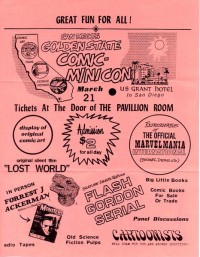
November 4, 2009
 Shel Dorf, 1933-2009
Shel Dorf, 1933-2009


The writer and comics historian Mark Evanier
brings word that Shel Dorf, the founder or a founder of Comic-Con International depending on one's interpretation of events, passed away on the afternoon of November 3. Dorf had been hospitalized for a lengthy period. His brother and survivor Michael was reportedly at his side.
Shel Dorf was born in Michigan. He was educated at the Art Institute in Chicago, and worked at the
Detroit Free-Press and in New York as a freelance commercial designer. Dorf was also, during all that time, one of America's most enthusiastic and outgoing comics fans, at a time when there really wasn't a template for how to be that sort of fan. Like many fans of newspaper strips -- Dorf was a huge fan of Chester Gould's
Dick Tracy and would consult on the 1990 film version -- the young, aspiring cartoonist kept a scrapbook of favorite strips clipped from local publications. He would later befriend several cartoonists and comics creators. As described in a 2006 profile in the
San Diego Union-Tribune:
He loved the stories, and he loved the artwork, and the people who created the comics were his heroes. He knew them all by name. When he grew up, he wanted to be one of them.
Back then, in the 1940s, being a fan didn't make you a creep. Nobody knew what "stalking" was. You got a star's picture or autograph because it meant something to you, not because you were going to sell it on eBay.
Not many people considered cartoonists stars, but Dorf did. He reached out to them, sent them custom Christmas cards. Some became his friends.
The relationships he cultivated in comics and among celebrities related to the fantastic corner of pop culture helped Dorf organize conventions in Michigan beginning in 1965 called Detroit Triple Fan-Fairs. They were among the first recognized modern conventions. When he moved to Southern California in the late 1960s after helping his parents re-locate to the area, he lent his efforts to build something similar in his new home region. That led to the series of shows whose annual expression is today known as Comic-Con International, North America's largest convention of its type.
Dorf's fingerprints are all over the early shows. In a story that's been told several times including in the recent
Comic-Con: 40 Years Of Artists, Writers, Fans And Friends!, Dorf rallied into service, focused and generally advised a number of local, mostly younger comics fans such as Richard Alf, Barry Alfonso, Bob Sourk, Dan Stewart and Mike Towry, lending further legitimacy to prominent and thriving regional fan organizations through his multitude of contacts and direct experience with such community-binding shows. The range of interests on display -- Dorf's particular passion for comic strips and their creator was one such thread that winds its way through the con's history -- ended up being a longtime strength of the show and the basis for the multitude of programming and show elements present in today's version.

Listed as founder and advisor on an early proto-San Diego Con flyer, Dorf served as as the organization's formal head for several years after those inaugural shows, and was widely recognized as a driving force for the show in its early years above and beyond a formal designation. When the show became a non-profit in 1975, Dorf was its board's first chairman.
Evanier reports an eventual break between Dorf and the show's organizers, certainly in effect by the early years of this decade. (The
San Diego Union-Tribune said in its obituary that Dorf spent about 15 years as a primary mover on the convention's most important committees.) Evanier estimates that his last attendance at Comic-Con may have come in 2001.
A devoted comics fan throughout his adult life, Dorf served as the letterer on the
Steve Canyon strip for its final years of publication. He spoke of that experience
here. According to Mark Evanier's send-off, Caniff made a character out of Dorf, a football player named "Thud Shelley." Jack Kirby's character Himon from
Mister Miracle was also based on Dorf, says Evanier.
Dorf suffered complications from diabetes and I believe related ailments, making it increasingly difficult for him to to walk and leading to his eventual long-term hospitalization. He was reportedly cheered by fans of the show and friends made along the way reaching out to him via letter or personal visit. Certainly as Comic-Con swelled in recent years to become something of a late-blooming pop culture phenomenon with comic book roots, interest was piqued in the story of the men and women who started that effort decades earlier from a desire to have so many things they loved and creators they admired in the same room at the same time.
The top page of
the Comic-Con web site contained the following message alongside a photo of Dorf:
Shel Dorf's love for comic books and their creators had no equal. It was his appreciation of this art form and his keen foresight that helped to create what it Comic-Con.
It is with a heavy heart that we -- the Board of Directors, Committee, Staff and Volunteers of Comic-Con -- mourn the passing of our dear friend.
A site devoted to his efforts and actions on behalf of the convention and his friends has been established
here. Funeral services are today.
posted 7:30 am PST |
Permalink
Daily Blog Archives
November 2019
October 2019
September 2019
August 2019
July 2019
Full Archives


